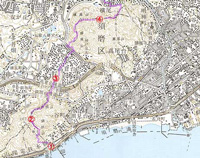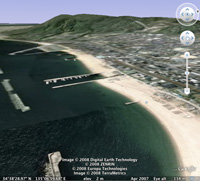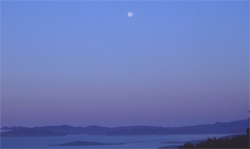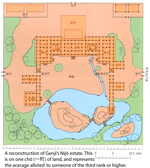Suma is southwest of Kyoto on the shore of the Inland Sea (瀬戸内海, Setonaikai), just past Kobe and very near the Akashi Straits. Akashi is on the same coast, a little further distance (Tyler footnotes it as about 5 miles). These would be somewhat remote regions (my rough estimate is that Suma was around 50 miles plus from the Capital), definitely, but they were on "highway" routes. A trip to this area, at that time, should be measured in days, depending of the entourage traveling (and much less than that if messenger by horse). In the story, Genji arrives in the afternoon of one day's travel by boat, with a good wind, but that is after traveling overland, a segment of the journey left unmentioned. Murasaki no Ue, when thinking of Genji's absence, describes it as "close" (近けれど NKBZ 2:182). (It is possible Murasaki's knowledge of geography is not very precise. This was certainly the case of Sugawara Takasue no Musume, the author of Sarashina nikki [translated as As I Crossed a Bridge of Dreams], about half a century later, and she was an educated woman. The narrative "feel" of Suma's location, as far as I read it, puts it a little closer than it was.) Water trade routes ran up and down this coastline, since the major arrival ports for trade from China and Korea were in Kyushu, to the south. The Kyushu Assistant Viceroy sends his family by boat back from Kyushu saying that the road cannot accommodate them all. Some maps I have seen indicate the highway from the Capital southwards (the one that would pass through this area) as a lesser highway, and certainly bandits would have been a consideration as well.Suma had a beautiful coastline (it is now overbuilt), and it does indeed have hills very close to the shore.
Suma topo map showing the proximity of hills to the shore
Suma GoogleEarth snapshot (search "Suma Seaside Park, Japan") showing beach and hills but I think it is likely that the modern beach is built, not natural
In this famous chapter, Genji exiles himself to Suma. Through his many goodbyes and correspondences we get something of a map of who is important in Genji's life. Among these, we notice that Murasaki no Ue is clearly his main object of romantic affection, but there are many others: Fujitsubo, Oborozukiyo (with whom he continues a very dangerous correspondence), Rokujō, Hanachirusato, and others. We see that he remains close to the household of his dead wife, especially the kind Minister of the Left and his son, Genji's best friend Tō no Chūjō, who risks social sanction to visit him (once) at Suma. We see that Genji continues to think of his father, visiting his grave before his departure, and that his (two) sons are on his mind.
It is also, therefore, a chapter replete with letters and poems. While some of these are poems within love letters, the Suma experience itself inspires Genji and those who have accompanied him to write some fine poems about the area.
There are, to my mind, two interesting reversals in this chapter: Fujitsubo begins to act more warmly towards Genji and Genji begins to view his attitude towards Rokujō with regard to "that one incident" as an error (一ふしうしと思ひきこえし心あやまりに NKBZ 2:186).
It is, after all, a chapter with enormous changes. We have basically for the first time left the social fabric of Capital (with the comfort, for Genji, of his women) and the material comfort of that place, to live more or less socially distanced (especially in terms of women), to be impressed by the stark autumn beauty of Suma, to be buffeted by its cold winter winds, and to be caught outdoors in a violent storm. And yet, while it is definitely the nadir of Genji's political career, it is one clearly headed for an upward trajectory, so this should be seen as the turn-around point of the story. Genji, through his actions and the shifting political situation, has been headed for trouble. He is now paying his way through that; it is a process, not an end-state.
The Chinese allusions in this chapter are especially frequent, in part because of the event of exile, in part because of the "men only" nature of his time in Suma. Even his newly built retreat has a Chinese flavor to it.
There are two or maybe three somewhat "haunting" passages in this chapter: when Genji goes to his father's grave towards the beginning of the chapter and when the mysterious storm and accompanying bad dream occur at its end. Then, for me anyway, the winter months in Suma have a similar feel.
The Akashi Lady (Akashi no Kimi), a major character, makes her first appearance (not in person) in this chapter. It will be one of Genji's most successful liaisons, providing a child whom Murasaki will adopt to carefully rear, and who will become empress (中宮).
Basic Story Summary:
Overview: Genji, under indirect but effective political pressure, decides to go into exile at Suma. He says goodbye to the people important in his life. At Suma he experiences a year of exile while painting, playing music, composing poems with the few who went with him, exchanging letters with the women he left in the capital, and receiving a few visitors. Near the end of the chapter we learn of Akashi no Kimi (who will be featured in the next chapter and who will eventually give birth to girl destined to become empress). Then, at the very end of the chapter, the combination of a supernatural storm and a dream where Genji speaks with a spirit push him towards the idea of returning to the Capital. In all the goodbyes and letters, we see clearly that Murasaki is Genji's main love. We can also see who stays cautiously in support of the new political group in power associated with the Minister of the Right, and who misses Genji's, father's days and the Minister of the Left.
Some highlights:
Genji, fully aware of the political forces arrayed against him, decides to exile himself to Suma, a place on the Inland Sea where Fujiwara no Yukihira was also exiled, not a great distance from the Capital but fully away from the Capital. Before leaving, he visits his father-in-law's to say goodbye there to him, Yūgiri, the ladies of Aoi, and so on. He also parts with Murasaki, Hanachirusato, exchanges letter with Oborozukiyo, says goodbye to Fujitsubo and the Crown Prince (his secret son, to be Emp. Reizei), then visits his father's grave in a scene where he does not seem too comfortable with how he measures up to his father's estimation.
Genji's 26th year, 3rd month, past the 20th night (hatsuka amari): Genji sails to Suma with minimal servants. They arrive the same day.
With help from his loyal attendants, Genji sets up house in Suma. His rustic place has something of a Chinese feel to it. From here, Genji sends letters to the capital to Murasaki, Oborozukiyo, Fujitsubo, the Minister of the Left, Hanachirusato and so forth. Many of their replies are also described. He also exchanges letters with Rokujō who is in Ise, also away from the Capital.
Genji's 26th year, 7th month: Oborozukiyo is allowed back at court and is shown as missing Genji more than loving Emperor Suzaku.
Genji's 26th year, autumn (8th month 15th day): Suma in the autumn. Genji wiles away the time with spontaneous music concerts, painting (the results of which are described as excellent), and poems, with an especially fine cluster written on the most important full moon of the year, that of the 8th month, by him and his men.
Genji's 26th year, 8th month: The Dazaifu Deputy (T) / assistant viceroy of Kyushu (S), from the southern Japanese island of Kyushu where major waterway routes from Japan and Korea are, is on his way back to the Capital. However, worrying about crossing the government officials currently in power, he defers from actually visiting.
Genji's 26th year, winter: Back at the Capital, hearing of all the letters being exchanged, and Genji's lifestyle at Suma, Kokiden remains very angry; knowing this, most Capital residents stop writing Genji letters. Suma in winter is bleak.
South on the coast, not far away, the Akashi Novice has heard that Genji is in exile near him, and thinks it is a good idea to introduce his beloved daughter . The mother resists but the father is insistent. The Akashi Novice is a distant relation to Genji (son of the brother of his mother's father).
Genji's 27th year 2nd month 20th day: Suma in the spring. Tō no Chūjō visits.
Genji's 27th year 3rd month 1st day: a freak storm blows up while Genji is seaside, where he had gone to free himself of demons in accordance with Chinese beliefs; in a dream Genji meets the Dragon King who tells him the Genji is being summoned to the capital.
Reading notes:
Seidensticker 220 / Tyler 229, Fujitsubo's love for Genji:
As Genji prepares to leave for Suma, Fujitsubo "writes frequently" (S)(常にあり). For those readers who wonder if Fujitsubo really loves Genji, beginning here this chapter offers many comments that indicate her love for him. (Though the more stubborn could argue that she is more worried that their son, the Crown Prince, will be less protected with Genji's absence — surely part of the calculus, but to make this the only factor seems to stretch things in my opinion.)
Seidensticker 220, timing of his departure to Suma:
"late in the Third Month" is 三月二十日あまり (san-gatsu hatsuka amari), a time in the month we have seen frequently.
Seidensticker 221 / Tyler 230, about Genji's exile:
I find it interesting how indirect the "order" for Genji to leave is; he is not summoned and given an imperial command to leave, he just knows that the political world does not support him and "seems" to expect him to do so (遠く放つかはすべき定めなどもはべるなるは、). He will be stripped of his offices, but this is done, I would suggest, after he has made clear his decision to leave rather than as a way of forcing him to leave. The timing is not explicitly narrated, however, so there is room for interpretation.
Seidensticker 222 / Tyler 231, moon phase — ariake no tsuki (dawn moon):
"The moon in the first suggestions of daylight" (S) "with dawn coming on and a lovely moon lingering in the sky" (T) These comments refer to the ariake no tsuki (有明の月), literally "presence of moon at dawn". At the time of the full moon, the moon rises when the sun sets (since they are directly opposite each other) and of course sets when the sun rises. The moon falls behind the sun's transversal of the sky by about one hour each day and so on the next day it will be about one hour above its setting horizon when the sun comes up. Thus, when the sky begins to show dawn colors but before the actual sunrise, the moon will be low and bright near the western horizon. If we add another day or two, the moon is low in the horizon 2-3 hours before dawn, at the time when lovers are supposed to leave so as to preserve the privacy of the meeting. Since the streets may be unlit or poorly lit, good moonlight was very useful for pre-dawn, discreet departures. Thus it is that the moon, in a stretch of days just after the full moon, is the most useful for romantic trysts and had associated with it this romantic flavor. This moon is called the "ariake moon" and has positive nuances. It is not a specific time but rather those few days after the full moon when, in the very early morning hours, the sky begins to take on color and the moon is working its way towards the western horizon. (Of course the moon continues to be "ariake" — in the dawn sky — for longer than these few days but it is not beautifully near the horizon and has now waned to the point of providing less light for early secret departures.)
Ariake no tsuki, looking west over San Francisco bay, Aug 29, 2007, 6:03AM. The moon was full this month on Aug 28, 3:34AM, and the sun rose on this day at 6:37AM.
Seidensticker 222 / Tyler 231, Aoi's mother:
"Princess Ōmiya" (S) "Her Highness" (T) refer to Aoi's mother, wife of the Minister of the Left and aunt (on father's side), as well as mother-in-law, to Genji.
Seidensticker 222 / Tyler 232, tigers & wolves:
This is a reference to Buddhist writings.
Seidensticker 224 / Tyler 233, status of Murasaki's biological father:
The story's narrator continues on this page with the negative evaluation of Murasaki's father and his wife who is Murasaki's step-mother, consistent with the portrait of them in Chapter 5 "Waka-Murasaki" and elsewhere.
Tyler 232, some phrase clarifications:
"At home again" = Nijō, "Her page girls" = Murasaki's page girls, "I stayed very late" ... at Sanjō (Aoi's estate).
Tyler 233, Prince Hotaru, Tō no Chūjō:
"Viceroy Prince" (Sochi no Miya) and "His Highness" (Shinnō) refer to the same Prince Hotaru. The Captain is Tō no Chūjō.
Seidensticker 224 / Tyler 233, Genji and mirrors:
This is at least the second time we have seen Genji looking at himself in a mirror. There is a brief scene near the end of Chapter 6, "Suetsumuhana" (S130) but my memory is there is a scene earlier than this, when Genji was yet younger.
Seidensticker 225 / Tyler 234, garden hills:
"heavily wooded hill" (S) "garden hill" (T). This is the artificial hill(s) in the garden, something not clear in Seidensticker's translation. Since Reikeiden's father was a great minister, his estate would be, as the NKBZ headnote reminds us, one chō (一町). This is about 14,400 square meters of which about half is a garden. 14,400 square meters is about 3.55 acres. It is also about 120 by 120 meters, or 130 by 130 yards.
Heian male aristocrats with rank three and higher received, as a rule, one chō for their residence land space; this ranking includes Daijin, Dainagon, and Chūnagon. (Tyler's "ministers," "grand counselors" and "counselors" ... Genji was promoted to rank three at a very young age). There were some exceptions with individuals living on four chō. Genji's Rokujō-in, too, is a four chō estate.
Heian male aristocrats with ranks four and five received 1/2 chō for their residence; this includes the sangi (Tyler's "consultants").
Heian aristocrats with rank six through nine received 1/4 chō for their residence, so they live on a plot of land about 30 by 30 meters.
For comparison: the basic residential land unit for the Heian city dweller was 1/32 chō, about 450 square meters, .11 acres, or a plot of land that was 15 by 30 meters (one chō was divided into 32 units using four columns and eight rows). A yellow school bus is about 13 meters long.
(rank three and above)
(basic city dweller unit)
Tyler 235, phrase clarification:
"Her Cloistered Eminence" = Fujitsubo
A reconstruction of Genji's Nijō estate, which would be similar in size and design to the one referenced here, on one cho of land. The hills are the ones that form the islands of the pond.
Seidensticker 231 / Tyler 239, "aware" & editor footnotes:
Regarding Yoshikiyo's work for Genji at Suma, Seidensticker writes that Genji looks on "admiringly" while Tyler writes "sad". The word in question is aware. While it certainly is a term very often in the sad register, it does have a broader meaning, and can even mean a surprised positive reaction. And while it is true that Murasaki may be even more inclined than most to use aware for a sense of pathos, it is also true that she is one who deploys language with great variety. To my reading, Seidensticker makes more sense here. Tyler perhaps chose "sad" after considering the NKBZ footnote for this passage which suggests that interpretation. Tyler's footnote is basically the same as NKBZ. This might be a good example of how much our own reading conclusions rely directly or indirectly on hundreds of years of interpretive reading.Tyler 240, phrase clarification:"His Reverence" is the uncle who looked after Murasaki when she was young. He is usually called "the bishop" by Seidensticker.Seidensticker 233 / Tyler 242, Genji's character/attitude towards his son:When thinking about Yūgiri: "Yet a father must, however he tries, 'wander lost in thoughts upon his child'" (S) but in Tyler "Perhaps he was not completely absorbed in a father's grief" (T) (なかなかこの道のまどはれぬにやあらむ). Tyler has missed the reverse rhetorical nature of にやあらむ here and ends up with a rather damning description of Genji. As Seidensticker notes, this line is based on a poem (Fujiwara no Kanesuke, Gosenshū 1003: The heart of a parent is not darkness, and yet / He wanders lost in thoughts upon his child. 人の親の心は闇にあらねども子を思ふ道にまどひぬるかな)Seidensticker 235 / Tyler 243, source of quote / Seidensticker's use of sources for his translation:"While I am still alive ..." (T) "We love while we live" (S). Tyler has identified the source (Shūishū 685). It is interesting that Seidensticker footnotes this as unidentified since NKBZ clearly identifies it. Perhaps Seidensticker did not consult NKBZ or perhaps he had his reasons for doubting the attribution.Seidensticker 235-38 / Tyler 244-46, famous autumn passage, Murasaki's use of the 8th month full moon:"At Suma ... (poem ending:) city of the moon" (T) "At Suma, ... (poem ending:) the distant city" (S). These pages form a very famous autumn passage, and one of the most often referenced portions of the text, when the topic is mono no aware. The set of poems on the migrating geese is, to me at least, particularly attractive. (By the way, Heian people believed geese to live in the north and only visit their area temporarily. Thus "returning geese" always means northbound geese, not those arriving to the Capital.) This evening of poetry happens during the full moon (15th day) of the 8th month, a very important date in The Tale of Genji. Other examples: Yūgao dies on the 16th of this month, Aoi dies a few days after the full moon of this month, Murasaki dies on the 14th of this month. This is also the full moon where, in Tale of the Bamboo Cutter, the moon army comes to reclaim the Moon Princess Kaguya-hime.
Seidensticker 241 / Tyler 248-49, plovers / chidori:
In all the Genji poems that have chidori (千鳥), the sound is emphasized, so I think this, more than its appearance, is a good focus of the reader's interpretive attention.
Chidori is a generic term and it would not be accurate to make a claim that Murasaki is referring to a specific type of chidori in this poem. Below is a type of seaside chidori called Kochidori (小千鳥). Here is a link to what seems like a defunct Jse web site, but one with excellent pictures, including the one below: kochidori
Below is a sound clip of a Kochidori:
Kochidori_song (mp3)
Seidensticker 244 / Tyler 251, music in Genji:
Tō no Chūjō hums from the saibara (催馬楽) song "The Well of Asuka" (Asukai, 飛鳥井). Also sung in Chapter 2, Hahakigi (S31).
飛鳥井に 宿りはすべし や おけ
蔭もよし 御もひも寒し 御まくさもよし
(On saibara: Elizabeth Markham. Saibara: Japanese Court Songs of the Heian Period. 2 vols. Cambridge: Cambridge UP, 1983.)
Seidensticker 246 / Tyler 253, translation comparison:
At the end of the chapter, Genji sees in a dream a spirit whom we are to understand is the Dragon King. As Tyler notes, the Dragon King was in search of a male for his daughter. Described as a spirit attracted to beauty (ものめでする), he seems very interested in Genji. He asks why he does not go to court, which has summoned him. "Court" surely here works doubly as the Dragon King's court and Suzaku's court at the Capital.
Seidensticker's and Tyler's final sentence to this chapter differ somewhat, with Tyler evoking correctly the ghost-tale atmosphere that The Tale of Genji sometimes draws near though it is less explicitly in the final sentence than a carry-over of the mood of the dream:
"Genji decided that he could stay no longer at Suma." (Seidensticker)
"So eerie a menace made the place where he was now living intolerable." (Tyler)
... いとものむつかしう、この住まひたへがたく思しなりぬ。(NKBZ 13:210)
This final paragraph is important, I think, in that it shows Genji as being pushed towards leaving Suma rather than resolving courageously (or with an intention to confront political forces) to return to the Capital. This is not a story of triumphant return, even though Genji's return leads to a rather grand life.




